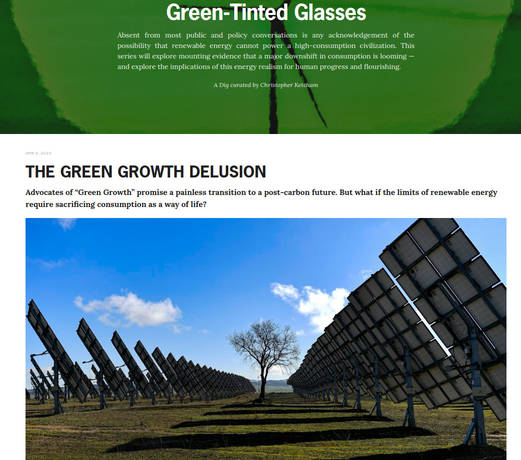Overwhelming research: “Green Growth” is a scam that accelerates lowering Earth’s ability to sustain life. Following or propagating it hurts us.
Podcast guest Christopher Ketcham compiled a bunch of research, including from two other podcast guests, Mark Z. Jacobson (not so positively) and Mark Mills, that overwhelmingly show that making up phrases doesn’t make the lies they represent true, such as “green growth,” “decoupling,” and “electrify everything.”
I recommend reading his article The Green Growth Delusion. It’s sobering, but wouldn’t you rather not operate under a delusion when your life and the lives of everyone you know depends on accuracy? While his article is comprehensive and points to more, there are plenty more.
I also recommend Alice Friedemann’s book Life After Fossil Fuels (I’m emailing with her to bring her to the podcast and have linked to her work before) and podcast guest Tom Murphy‘s Energy and Human Ambitions on a Finite Planet and his recent peer-reviewed paper.
A few days after Ketcham’s article came one from Andrew Nikiforuk: The Rising Chorus of Renewable Energy Skeptics, which links to Friedemann and Murphy, along with podcast guest Simon Michaux’s work.
Normally, I’d pull some quotes, but nearly every sentence of the article belies our vain, unjustified hope that we can keep our society and culture going without polluting and depleting ourselves to death.
A Saving Grace
There is a saving grace to this quagmire, that fossil fuels and their alternatives are not necessary for life or flourishing, only for our addictions and cruel parts of our culture. The feeling of need to feed an addiction may in practice be greater than biological needs, but their non-necessity points to a solution: stop using them. Nearly no one I talk to considers it possible, but most people who pollute most can reduce well over 90 percent in under three years, as I did, but I did it and, as Einstein said, “I have no special talent. I am only passionately curious.”
To an addict, stopping using them may sound like sacrificing warmth, support, understanding, love, and family in an otherwise cruel, heartless world, but recall: You tell me what you fear losing and I’ll tell you exactly what you’ll experience more of. You will have to face withdrawal, but on the other side of it, you’ll wish you had started earlier. You will want to help others across. As impossible a prospect for a meth user to imagine more energy with out meth or a doof addict to imagine apples sweeter than Ben and Jerry’s, you may not be able to imagine living sustainably meaning more family, financial security, helping less fortunate, and other things you want.
Sustainability brings them. Unsustainability deprives us of them. It stands between us and them.
We can turn this around. The problem is that we are addicted to what keeps us down, what funds the hierarchy putting its boot in our face. The way a heroin addict feels they love heroin or doof addict feels they love salt, sugar, and fat mixed to a bliss point, we feel we love what pollution brings, associating it with what we love and supports us. It isn’t love, though, but craving. We associate things pollution and depletion bring us with family, but forget that they distance us from family in the first place.
The prospect of losing billions of lives in a few decades amid skyrocketing pollution sounds bad, all the more when the source suggesting it comes with half a century of accurate modeling with no other model as close. We can hope that a miscalculation that didn’t show for fifty years will suddenly show that simulation irrelevant and that civilization will not collapse. That strategy has failed since before Limits to Growth and keeps prompting inaction, so I don’t hope for it.
I know one strategy that sounds impossible, but it’s based on something else I would have imagined impossible too, but it happened: hundreds of millions of Americans reducing their impact by over ninety percent in under three years, finding they prefer the result, and reducing more. I would consider such an outcome impossible, but I would have considered even one person doing it impossible too. But I did it and found joy, freedom, fun, community, connection, meaning, and purpose, so it’s not impossible. I did it with almost no role models. I was stubborn and resisted change more than most Americans I know of and likely than you.
I did it, so I was wrong about one person enjoying sustainability. I could be wrong about the American people. Maybe we can repeat faster, more effectively something like what we did in 1865, but, if we learn from history, without the Civil War and without the mistakes of Reconstruction.
Read The Green Growth Delusion.
Read my weekly newsletter

On initiative, leadership, the environment, and burpees

Pingback: Ecomodernists, techno-optimists, and closed-loop advocates: why don’t you believe your own hype? » Joshua Spodek